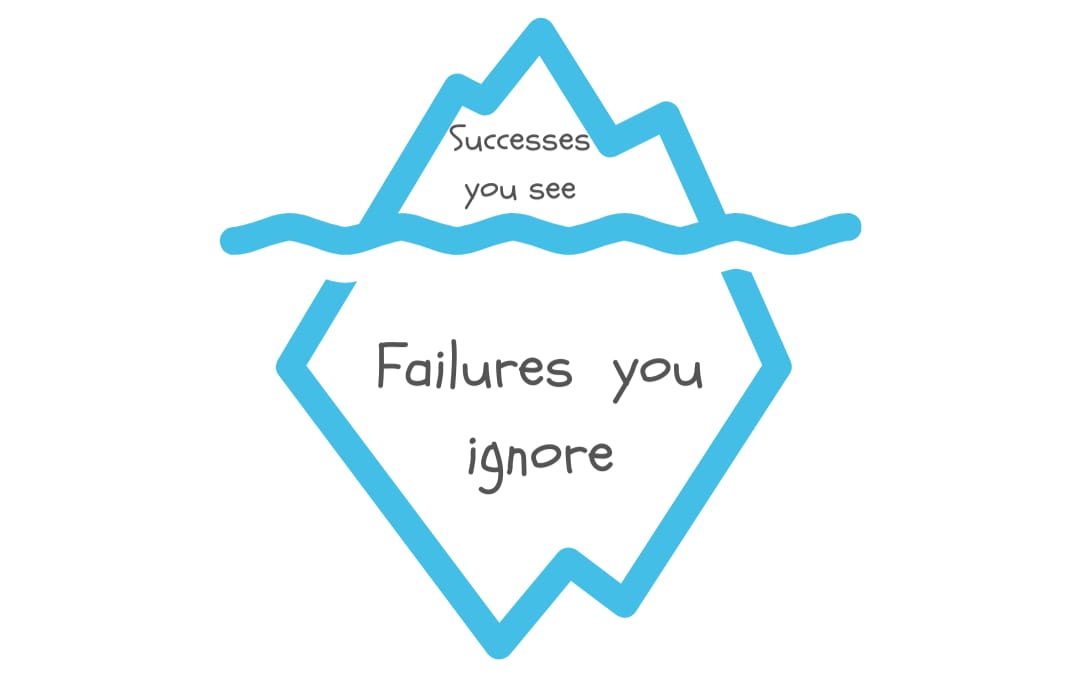Starting with televisions, newspapers to multiple social media platforms such as Facebook or Instagram; we often come across delightful stories of success. We have heard of Mark Zuckerberg’s revolutionary tale of achieving success as a college dropout. The Beatles, arguably the most popular band in history, made headlines as the musicians that sold billions of albums.
Today, we see so many people with a desire to be successful and it seems possible to achieve something from absolutely nothing. However, while dreaming of success, we often forget about all the possibilities of failure. As we are overwhelmed with stories of triumph, we often forget how slim chances there are to get successful. It feels quite easy to reach great heights when in reality, it is a far cry. These illusions of success make us victims of the survivorship bias.
What is Survivorship Bias?
Survivorship bias is a form of selection bias in which we only concentrate on the successful results and ignore everything else. It leads to an erroneous understanding of the world as we put our attention on only what survived. We focus on winners rather than on who tried hard but could not achieve the results they wished for.
Let this be in business, finance, music, or arts, survivorship bias is everywhere.
We always admire stories where a hero overcomes the impossible and is declared victorious. We do not want to hear stories where the main character fails to win the race. It is because, sometimes, we only focus on surviving and ignore everything else. We overlook the hardships, the struggles. What matters is whether something or someone is successful or not.
From successful business ventures to highly popular musicians and many more, the media always loves to highlight such success stories as viewers admire these. However, behind every success story, we can find hundreds of individuals who worked hard but; never made it to the top. Behind a billion-dollar enterprise, there exist some entrepreneurs who invested millions in businesses that eventually failed. Maybe thousands of musicians also lived who toiled hard but could not sell a single album in years and finally gave up afterward.
Today, we see so many people with a desire to be successful and it seems possible to achieve something from absolutely nothing. However, while dreaming of success, we often forget about all the possibilities of failure. As we are overwhelmed with stories of triumph, we often forget how slim chances there are to get successful. It feels quite easy to reach great heights when in reality, it is a far cry. These illusions of success make us victims of the survivorship bias.
What is Survivorship Bias?
Survivorship bias is a form of selection bias in which we only concentrate on the successful results and ignore everything else. It leads to an erroneous understanding of the world as we put our attention on only what survived. We focus on winners rather than on who tried hard but could not achieve the results they wished for.
Let this be in business, finance, music, or arts, survivorship bias is everywhere.
We always admire stories where a hero overcomes the impossible and is declared victorious. We do not want to hear stories where the main character fails to win the race. It is because, sometimes, we only focus on surviving and ignore everything else. We overlook the hardships, the struggles. What matters is whether something or someone is successful or not.
From successful business ventures to highly popular musicians and many more, the media always loves to highlight such success stories as viewers admire these. However, behind every success story, we can find hundreds of individuals who worked hard but; never made it to the top. Behind a billion-dollar enterprise, there exist some entrepreneurs who invested millions in businesses that eventually failed. Maybe thousands of musicians also lived who toiled hard but could not sell a single album in years and finally gave up afterward.

As stories of accomplishments are more frequently published, we often fall into a false perception that only hard work is needed to be successful. We overlook all the external factors that worked in favor of few that, in contrast, were against others.
For instance, some of the world’s richest men, such as Steve Jobs, Mark Zuckerberg, Bill Gates, dropped out from college and became successful later on. Following the trend, many people feel it safe to conclude that college dropouts become rich. Whereas, in reality, there are thousands of college dropouts that were not as fortunate and could not perform well as entrepreneurs.
For instance, some of the world’s richest men, such as Steve Jobs, Mark Zuckerberg, Bill Gates, dropped out from college and became successful later on. Following the trend, many people feel it safe to conclude that college dropouts become rich. Whereas, in reality, there are thousands of college dropouts that were not as fortunate and could not perform well as entrepreneurs.

A Famous Author on Survivorship Bias
One of the most renowned writers, Rolf Dobelli, described survivorship bias as a common phenomenon in his international bestseller “The art of thinking clearly”. He further explained that only focusing on success does not help in improving or increasing the chances of reaching greater heights. One should always keep in mind that any idea has a higher chance to fail than to succeed. However, with this, Rolf Dobelli did not mean to only focus on failures but to keep a balance and be realistic as much as possible while making decisions.
Overcoming Survivorship Bias
Everyone will not have the same situations, same skills and abilities, or similar competitive pressures. Thus, it is not wise to compare one’s journey with a successful person as just because a strategy worked for them, it doesn’t mean that the same plan will work for someone else. Each person should have a unique scheme considering all the internal and external factors.
Due to greater visibility of successful people’s life stories, we often overestimate the chances of success. Therefore, it is advisable to not look at only what we can see. We should also consider the participants that also ran fast on the track but could not win.
Inspirational stories motivate people to work hard – it is not wrong to read them at all. But, looking at the downsides once in a while keeps one’s vision as rational as possible.
Success is something that occurs once within a million tries. Hence, just reading books based on billionaires will not help make someone rich. Confidence, motivation and passion accompanied with rationality will prove to be more effective to reach accomplishment.
One of the most renowned writers, Rolf Dobelli, described survivorship bias as a common phenomenon in his international bestseller “The art of thinking clearly”. He further explained that only focusing on success does not help in improving or increasing the chances of reaching greater heights. One should always keep in mind that any idea has a higher chance to fail than to succeed. However, with this, Rolf Dobelli did not mean to only focus on failures but to keep a balance and be realistic as much as possible while making decisions.
Overcoming Survivorship Bias
Everyone will not have the same situations, same skills and abilities, or similar competitive pressures. Thus, it is not wise to compare one’s journey with a successful person as just because a strategy worked for them, it doesn’t mean that the same plan will work for someone else. Each person should have a unique scheme considering all the internal and external factors.
Due to greater visibility of successful people’s life stories, we often overestimate the chances of success. Therefore, it is advisable to not look at only what we can see. We should also consider the participants that also ran fast on the track but could not win.
Inspirational stories motivate people to work hard – it is not wrong to read them at all. But, looking at the downsides once in a while keeps one’s vision as rational as possible.
Success is something that occurs once within a million tries. Hence, just reading books based on billionaires will not help make someone rich. Confidence, motivation and passion accompanied with rationality will prove to be more effective to reach accomplishment.
References
(n.d.). Retrieved from FS: https://fs.blog/survivorship-bias/Dobelli, R. (2013). The Art of Thinking Clearly. Sceptre (UK), Farrar, Straus and Giroux(USA).
Washchenfelder, T. (2018, January 1). Retrieved from Wealest.com: https://www.wealest.com/articles/survivorship-bias




